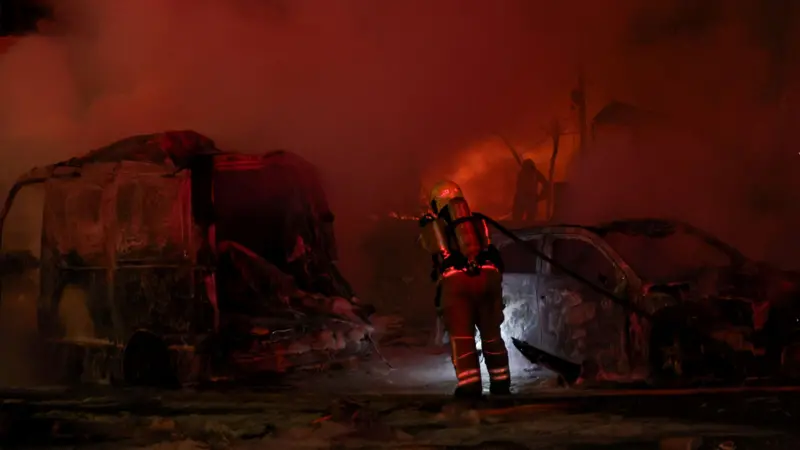
Iran’s missile attack against Israel left at least 5 dead
The conflict between Israel and Iran enters the fourth day on Monday (16/6), with at least 244 people killed so far: 224 in Iran and 20 in Israel, according to official data from both governments.
A spokesman for the Israeli Armed Forces stated that Israel “reached total air control over Tehran,” Iranian capital.
“We destroyed a third of the surface-superficial missile launchers of the Iranian regime,” Effie Defie Brigadier Effie said at a press conference.
In the last few hours:
- Iran has launched another series of missiles against targets in Israel. A BBC reporter said the amount of missiles “looks like the largest so far.”
- At least five people died in central Israel after Iranian attacks, with dozens of injured and hospitalized. With this, the total of dead in Israel has reached 20 people in four days.
- Explosions have reached large Israeli cities, including Tel Aviv and the Haifa port city, where about 30 people were injured.
- Iranian attacks occurred shortly after Israel launched attacks on Terra-terra missile bases in Iran and kill the head of intelligence of Iranian Armed Forces, Mohammad Kazemi.
- At least 224 Iranians have been killed in Israeli attacks since the beginning of hostilities between the two countries on Friday (13/06), with 90% of victims being civilians, according to the Ministry of Health of Iran. BBC is prevented from working in Iran due to restrictions imposed by the government. Therefore, it is not possible to verify the figures released by the Iranian government.
About the Iran’s attack that killed five Israeli civilians and injured dozens, Israel Katz’s Minister of Defense, said the residents of Tehran “will pay the price.”
Katz called the Iranian leader there Khamenei “cowardly killer” and “smug dictator,” and said Israel will retaliate “soon.”
The US ambassador in Israel reported that his embassy in Tel Aviv suffered “light damage” during Iran’s nighttime attacks.
Mike Huckabe published in X that the consulate was affected by Iranian missiles fired near the building in Tel Aviv. No US employees was injured, he said. And the US embassy in Jerusalem will remain closed.
Iran’s Foreign Ministry spokesman Esmail Baghai said that after the cancellation of nuclear negotiations between US and Iran, scheduled for Sunday, the US must “condemn” Israeli attacks on Iran for negotiations to continue.
Baghai said negotiations are “meaningless” in the current situation and accused the US of being “accomplices” of Israeli attacks.
International community
US President Donald Trump said he hopes that Israel and Iran will reach an agreement, but sometimes countries need to “fight to the end.”
In conversation with reporters before leaving for the G7 summit in Canada, Trump said the US will continue to support Israel, but refused to say if he asked the country to suspend his attacks on Iran.
The American media reported that Trump rejected an Israeli plan to murder Iran’s supreme leader, Ayatollah Ali Khamenei.
Trump would have told Netanyahu that murdering Khamenei “is not a good idea,” according to an authority cited by the American network CBS. The president did not publicly comment on the news. Netanyahu did not confirm or denied it.
The attacks occur while G7 leaders gather to a summit in Canada, where all looks will be facing Israel and Iran.
The Council of the International Atomic Energy Agency (AIEA) called an emergency session on Monday to discuss the repercussions of Israeli military attacks on Iranian nuclear facilities.
The session was requested by Iran and supported by Russia, China and Venezuela.
Iran initially tried to present a resolution during the weekend condemning the Israeli attacks. However, according to diplomatic sources, the resolution is unlikely to receive support from the majority. As a result, Iran changed its focus to support a more general statement that still included the condemnation of Israeli actions.
The emergency session takes place amid military negotiations between Iran and Israel, including Israeli attacks against Iranian nuclear facilities in Natanz and Fordow, BBC reporter in Vienna, Shabam Shabani says.
“Military action has never been accepted to address nuclear concerns within the Nuclear Non -Proliferation Treaty (TNP). Iran insists that the international community and the AIEA governor council must condemn the attacks. However, given the current geopolitical climate, such a conviction seems unlikely,” says BBC reporter.
“It is also unclear whether the result of this meeting can make way for an immediate ceasefire between the two regional powers, which continue to launch retaliatory attacks on the territory of each other with increasing intensity.”
China appealed to Israel and Iran to take action to reduce tension, while attacks on both sides continue.
“We have made all parties to take immediate measures to calm tensions, prevent the region from plunging into even greater turbulence and creating conditions to return to the right problem solving through dialogue and negotiations,” said China’s Ministry of Foreign Ministry, Guo Jiakun, on Monday.
The comments were made after another Chinese government spokesman said on Sunday that “China is willing to play a constructive role in this process” of tension reduction.
Iran attacked Israel with missiles at dawn on Monday | EPA
The president of the European Commission, Ursula von der Leyen, said she told the Israeli prime minister on Sunday that diplomacy would be ultimately the best option to deal with Iran, but did not even ask for an immediate ceasefire.
Von der Leyen said he agreed with Netanyahu on a call that “Iran should not have a nuclear weapon without question.”
Von der Leyen had already criticized Israel’s actions in Gaza, but stated that non -compliance with Iran by the UN nuclear authorities means that Israel “has the right to defend itself.”
“Iran is the main source of regional instability,” said the European leader.
Von der Leyen is currently in Canada participating in the G7 summit, where he stated that the conflict between Israel and Iran would be approached, along with the Russian invasion of Ukraine.
“The same kind of drones and ballistic missiles designed and manufactured by Iran are indiscriminately reaching cities in Ukraine and Israel. Therefore, these threats need to be faced together,” she said.
Global oil prices rose on Monday after the conflict between the two countries.
At the beginning of the trading session in Asia, future oil contracts rose more than $ 2, or about 2.8%, to $ 76.37 the barrel. US gross oil also rose about $ 2 to $ 75.01.
The gains added to the 7% increase registered on Friday.
Market negotiators are concerned about the possibility of the conflict between Iran and Israel interrupting the supply of the region.
The cost of oil affects several other prices in the economy – such as gasoline and food.
Originally published by BBC News on 16/06/2025
Source: https://www.ocafezinho.com/2025/06/16/mais-de-240-pessoas-morreram-em-4-dias-de-conflito-entre-israel-e-ira/

